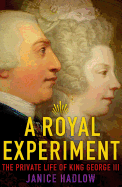
Most Americans know two things about King George III of England: he held the throne during the American Revolution and he slipped into madness (a condition exemplified by his addressing Parliament as "my lords and peacocks"). In her first book, A Royal Experiment: The Private Life of King George III, Janice Hadlow presents a richer portrait of the regent, showing him as son, husband and father as well as ruler.
The Hanoverian kings of England were notorious for hating their heirs. They displayed that hatred in a public and often vicious fashion, and their heirs retaliated with equally public acts of political defiance. When 22-year-old George III inherited the throne from his grandfather, he was determined to build a family life different from the one he experienced as a child.
Hadlow begins with the three generations of Hanoverian royalty who preceded George III, describing dysfunctional family relationships that make soap-opera plots look tame by comparison: loveless marriages, parents separated from their children against their will, a wife imprisoned for adultery (or at least considering adultery), a mother who refused to see her son on her deathbed. The heart of the book explores King George's efforts to be the moral compass of his nation and to reconcile the values of domesticity with the demands of kingship--a noble experiment with mixed results and long-term consequences for the modern idea of monarchy.
A Royal Experiment will appeal to lovers of biography, Georgian England or royal scandal. --Pamela Toler, blogging at History in the Margins

